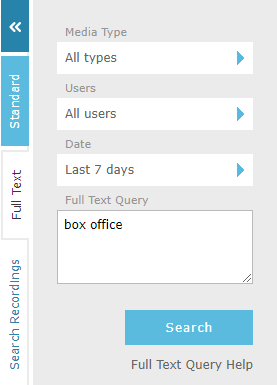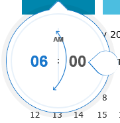Defining Full Text Search Criteria
The full text search criteria bar contains all the available search parameters to allow you to perform a full text search of recordings.

|
|
Use the |
Click the ![]() icons to bring up a dialog to edit each type of search criteria. The following types of search criteria are available:
icons to bring up a dialog to edit each type of search criteria. The following types of search criteria are available:
- Media Type to return all recordings (default) or restrict by media type.
- Users to restrict search results by selected users or all users.
|
|
You can use the Department, Location and Status filters or the Search box in the User dialog to restrict the user data displayed. |
- Date to restrict search results by recording start date and time or all dates. The date criteria has the following options:
- Any to show all call records, without any date or time restrictions.
- Last X Days to enter the number of days of data to display, counting back from today. Enter an integer in the range 0 to 10000, with 0 representing today.
- Range to define start and end dates using the calendar provided, then optionally start and end times using the “time dropper” control. Move the teardrop around the circle to increase/decrease the time. Click on the minute value to switch to incrementing by minutes and vice versa by clicking on the hour value.
- Full Text Query to enter the search query:
A query to the full text query parser is broken up into terms and operators. There are two types of terms: single terms and phrases. Multiple terms can be combined together with Boolean operators to form more complex queries (as described below).
- A single term is a single word
- A phrase is a group of words surrounded by double quotes such as "hello dolly"
Wildcard Searches
- ? matches a single character
- matches zero or more sequential characters
Fuzzy Searches
- ~ to find terms that are similar to a specified term without necessarily being an exact match.
Boolean Operators
- AND (or &&) Requires both terms on either side of the Boolean operator to be present for a match.
- NOT (or !) Requires that the following term not be present.
- OR (or ||) Requires that either term (or both terms) be present for a match.
- + Requires that the following term be present.
- - Prohibits the following term
When specifying Boolean operators with keywords such as AND or NOT, the keywords must appear in uppercase.
This is by no means a comprehensive list of supported search syntax. Detailed information is available on the Apache Solr website:
https://lucene.apache.org/solr/guide/7_5/query-syntax-and-parsing.html
See Also:
Defining Recording Search Criteria

